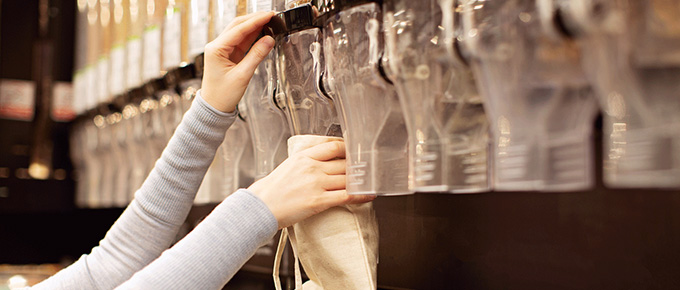Economic shifts
Consum’actor: when consumers change the rules of the game

Consum’actor? The word may look a bit vague, but it reflects a profound change – expressing the desire of a growing number of consumers to no longer be the passive recipients of companies’ goods and services. Instead, they have become thoughtful in their buying habits, and are guided in their choices by ethical and environmental considerations. This new relationship with consumerism affects every sector – food, clothing, energy, etc. Here’s a closer look at a disruptive change that is creating a chain reaction.
End the top-down attitude of brands to their customers. Stop being a passive observer. The days of demanding an alternative to the capitalist system are over, and it’s time to transform it from the inside, slowly but surely. “In practice, being a critical consumer means taking a different approach, and changing the way that pressure is applied to capitalism,” explains Eric Rémy, a professor specialising in the cultural and social aspects of consumerism1. Ethical consumption, sustainable or responsible consumerism… whatever the term being used, the aim is the same: to make consumerism an act and, albeit not political, at least a conscious one.
Continuation of an age-old practice
While this approach has become more widespread in recent decades, the phenomenon is older than it may seem. The first consumer boycotts were recorded in 18th century England and targeted cane sugar from the Caribbean produced by slaves. This first consumer movement led to the labelling of “East India sugar not made by slaves” on sugar pots2. Later, at the start of the 20th century, consumers began to come together in specially-formed associations. In France, the League of Consumers was founded in 1909 with the highly-evocative slogan “I spend, therefore I am.3” However, ethical consumerism only really took off in the second half of the 20th century. During the 1990s, the denunciation by an American NGO, Global Exchange, of abusive practices by brands like Nike and Gap resonated with public opinion around the world.
Since then, the trend has only become more developed, along with consumers’ mistrust of manufacturers. The reason lies not only in the climate emergency, but also a series of health scandals that have made a lasting impression on public consciousness, including smoking, ‘mad cow’ disease, and the misdeeds of colourings, additives, etc. This crisis of confidence is also being fed by a feeling among many people that by multiplying the number of intermediaries and the distances being covered, globalisation makes it impossible to have precise knowledge about a product’s contents. Yet, at the same time, the internet is giving consumers the possibility to find out more about what they are buying, and to go beyond the marketing blurb of the brands.
Responsibility and the environment, new opportunities for consumer choice
But who are these consum’actors, whose buying decisions change in line with their personal priorities? Accurately identifying their expectations, like their profiles, is a tricky task. “Unlike a militant activist, the consum’actor might take action as an individual, on an ad-hoc basis. That’s a problem when you want to engage with them, because they are potentially very numerous,” underlines Eric Rémy4.
And yet, a number of trends are emerging. A major survey conducted by the Observatoire Cetelem in 15 European countries5 examined how people were becoming more aware of a collective approach to consumerism. “We were doing this kind of research in 2010 and we discovered the ‘consum’actor’, an individual who consumes in a way that’s better for their health and for supporting small local shops,” explains Flavien Neuvy, Director of the Observatoire. “Today, the environment is key. People are thinking about others, as well as themselves, when they buy something6.” The survey also highlighted a series of paradoxes, starting with the fact that 75% of Europeans think their consumer habits will not change – but say they are personally willing to do so. At the same time, 35% of them believe the solution to climate change can only come from consumers themselves, by driving change in what the supply side of the economy has to offer. Meanwhile, in a large-scale survey carried out among 20,000 consumers in North America, Europe and emerging economies, one third of those consulted said their brand choices were now based on the environment or social impacts7.
A powerful minority
While the trend is undeniable, consum’actors are far from being the majority. Consumer consultancy Kantar Worldpanel estimated in 2018, for example, that 22% of French people chose products with better or more virtuous reputations than standard offerings. As for the typical profile of these new consumers, Kantar’s study pointed to senior citizens, living in urban areas with relatively high incomes. Though a minority, they are now a force to be reckoned with.
It’s also worth highlighting that researcher Erica Chenoweth has shown how mobilising even a small proportion of the population is usually enough to change social mores. Her project, which looked at about 100 campaigns of non-violent peaceful resistance between 1900 and 2006 (‘Why Civil Resistance Works,’ 2011) showed that once 3.5% of the population gets behind a cause by expressing their resistance in their behaviours, those causes succeed in their goals8. What’s more, suppliers have everything to gain from taking the concerns of the most committed consumers into account. Firstly, because doing so would enable them to satisfy a very precise economic demand. But secondly, there are also strategic reasons in play: in the era of social media, the more committed the consumer, the more willing they are to become a brand ambassador. Consultants Bain & Co. believe that increasing the retention of the best customers by 5% leads to a rise in sales of between 25% and 55%9.
The ethical dimension therefore has a link to the business case. It’s a good reason for being decidedly optimistic about the willingness of the world’s companies to include climate change in their future strategies.
